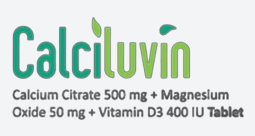
Calcium Citrare 500 mg
+ Magnesium Oxide 50 mg
+ Vitamin D, 400 IU Tablet
Calcium citrate is the calcium salt of citric acid. It is commonly used as a food additive, usually as a preservative, but sometimes for flavor. In this sense, it is similar to sodium citrate. Calcium citrate is also found In some dietary calcium supplements. Calcium citrate is absorbed equally well when taken with or without food and is a form recommended for individuals with low stomach acid, inflammatory bowel disease or absorption disorders. Calcium citrate increases plasma calcium levels. This reduces calcium flux from osteocyte activity by reducing the secretion of parathyroid hormone(PTH). Calcium does this by stimulating a Gprotein coupled calcium receptor on the surface of parathyroid cell. Calcium citrate is better absorbed than calcium carbonate by approximately 22% to 27%, either on an empty stomach or co-administered with meals.
Magnesium is mineral that your body needs to function properly. Magnesium oxide is a supplements that contains Magnesium and Oxygen ions. It’s used to treat a variety of conditions, including heartburn, indigestion, constipation, a Magnesium deficiency, and other aliments. Approximately half of the Magnesium in the body is found in the bones and it is an essential nutrient to keep them strong and healthy. Magnesium also plays an important role in maintaining the function of nerves and regulating muscle relaxation. A deficiency in magnesium is associated with the occurrence of muscle spasms, tremors and convulsion. 6 low magnesium levels have also been associated with psychiatric problems such as depression and schizophrenia. Magnesium oxide can help boost low magnesium levels, relieve constipation, manage depression, treat migraines.
Vitamin D is a fat soluble Vitamin that regulates calcium and magnesium metabolism in the body. Vitamin D promotes intestinal absorption of calcium by the kidneys. It is therefore essential for the calcification of bones and teeth. New research has also found vitamin D inversely associated with the incidence of upper respiratory tract infections.
Calcium, Magnesium, and Vitamin D work together in the body to enhance each others overall absorption and utilization. Vitamin D increases the absorption of calcium. Calcium and magnesium are essential factors in the formation and maintenance of healthy bones, but they also play an important role in the contraction and relaxation of the muscles, including the heart. When calcium flows into the muscle tissue cell they contract. When calcium leaves, magnesium replaces it and the muscle relaxes. They also work together to normalize the muscle tone of blood vessels. Calcium plays a very important role in the body. It is necessary for normal functioning of nerves, cells, muscle, and bone. If there is not enough Calcium in the body, then the body will take calcium from bones, thereby weakening bones. Vitamin D helps your body absorb Calcium and phosphorus.